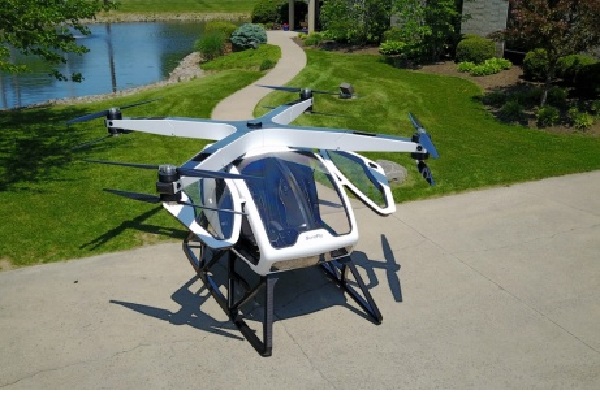A company called the Workhorse Group wants to beat Amazon to the punch and provide the U.S. Postal Service with thousands of electric-powered mail trucks equipped with delivery drones. But that’s not all: CEO Steve Burns sees flying cars in the company’s future.
It’s a dream that’s already attracting tens of millions of dollars in funding for Silicon Valley startups.
“I know a couple of people who are working on it,” Burns acknowledged today at Bellevue’s Meydenbauer Conference Center. “But we’re trying to do it first.”
Burns provided a sneak peek at his Indiana-based company’s plans for a hybrid flying car – or, to use his preferred term, the Surefly personal flying machine – during the Advanced Transportation Technologies Conference, organized by the Center for Advanced Transportation and Energy Solutions.
He told GeekWire that Workhorse plans to unveil a prototype in June, and that the two-seat drone would eventually be sold and operated as a sport aircraft. Surefly could become the “greenest, fastest and most economical way to travel,” he said.
“It’s safe, its going to cost less than a Tesla, and it’ll going to fit in your garage,” he said. “And it’s less expensive to go, as the crow flies, from here to the airport, than any other mode of transportation.”
What’s more, he’s already thinking about a bigger Version 2.0 with wings.
“I’ll tell you, this could revolutionize traffic around here,” Burns said. “You could go over Lake Washington. Instead of two bridges, you’ve got fleets of these flying across the lake.”
Does Burns have his head in the clouds? Maybe the idea isn’t quite as crazy as it sounds: At January’s CES show in Las Vegas, a Chinese company showed off an autonomous single-seat quadcopter that’s already been flight-tested. And in October, Uber laid out its vision for fleets of flying cars that could revolutionize urban commuting.
The Federal Aviation Administration would have to give its go-ahead, but Burns is counting on the regulatory hurdles to be worked out by the time Workhorse is ready to go commercial.
In cooperation with the University of Cincinnati, Workhorse is already testing a smaller breed of flying vehicle known as the HorseFly. The quadcopter plays an important role in the concept that the company is trying to sell to the Postal Service.
Workhorse and its manufacturing partner, VT Hackney, are among six finalists in a long-running competition for a contract to replace tens of thousands of mail trucks with next-generation vehicles. The Workhorse team’s concept relies on hybrid electric trucks that can send out HorseFly drones to drop off packages.
The Postal Service has ordered up 50 trucks for testing, to be delivered within the next year. The winner would be selected after six months of further evaluation. That suggests the HorseFly drones could be deployed before Amazon’s drone delivery fleet goes into action in 2020 or so.
Workhorse’s drones won’t go beyond the driver’s visual line of sight. Instead, they’ll make short hops to drop off deliveries, then return to the truck to recharge. That should keep the system in compliance with the flight rules laid out by the FAA in June.
“We’ve been doing this for several months, testing [with] live, real houses,” Burns said.
The typical cost of operating a diesel-powered mail truck is about $1 per mile, he said. In contrast, the electric truck’s operating cost is as little as 25 cents per mile, and the figure for the HorseFly drone is 2 to 3 cents a mile.
“Two or three cents a mile, no pollution, no maintenance, no driver time. People ask me if this is fantasy or if this is really going to happen,” Burns said. “With those kinds of economics, it’s going to happen.”
It’s already happening, to some extent: Workhorse (formerly known as Amp) has sold more than 100 hybrid electric delivery trucks (sans drones) to UPS, FedEx, Cintas and Chicago’s Alpha Baking Company. And that’s not all: Workhorse is already taking advance orders for a plug-in hybrid electric pickup truck.
“Duke Energy ordered 500 of them right out of the gate,” Burns said. “We’re two years from producing them, and it’s compelling enough that people are pre-ordering them now. It has a lot of innovation. The body is all carbon-composite. It’s completely different. Again, like our other trucks, it looks from the outside the same as a regular pickup, but we’re going to try to reinvent that space.”























